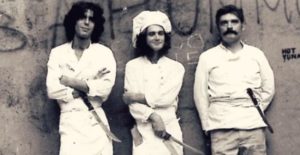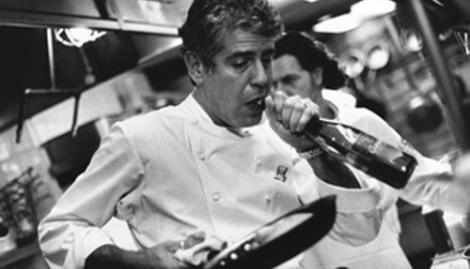The outpouring of emotion within the restaurant world when Anthony Bourdain died unexpectedly last month reminded us all how restaurants are like family. His unexpected passing hit many of us harder than most celebrity deaths because we considered Tony an honorary member of ours.
If you spend any meaningful period of time working in the restaurant industry, the tree of people you work with in different jobs has long branches and deep roots. The word “incestuous” is often used when we describe how intertwined those relationships are. The meals we eat together before our shift are called “family” meal. We preview our newest restaurants with mock services referred to simply as “Friends and Family.” If industry comrades visit our restaurants, we shower them with extras and we charge them for less than they ordered. Our solidarity is only something you can understand if you’ve ever burned yourself on a hot Rondeau or entered an order into Micros—we live and die for each other.
Bourdain had expressed in interviews that he wrote Kitchen Confidential with his fellow line cooks in mind. His criteria for publishing it hinged on whether they would consider it worthwhile reading. If not, he said, then no one should read it. Surviving restaurant life was a badge of courage that Tony wore proudly and he had the scars—both literally and, sadly, maybe also figuratively—to prove it.
No matter how mainstream he’d become in the culinary world, Bourdain was royalty to line cooks—the Michael Jordan of blue-collar chefs. It was rare for a cook, one who never seemed particularly comfortable being regarded with the same reverence as a chef, to be so revered. As a populist food personality, he flourished in an era of swirly sauces and molecular gastronomy without being tempted to cook that way. Of course, he respected the talents of those chefs (ok maybe not all of them) but always viewed his membership in the club with skepticism. Though he may not have been cooking in a professional kitchen as of late, Chef Bourdain was one of the first to make it cool to be a line cook. This blog—as well as every social media outlet related to food and restaurants—likely wouldn’t exist without Tony having fascinated laymen by revealing the secret world of restaurants.
I often wonder why I still work in the industry. I’m tired. My feet hurt. The hours are terrible—routinely over 50-hour weeks along with 10-12 hour double shifts. When you wait tables, the only way to get a raise is by waiting on more tables. Vacations are a luxury that most of us can’t afford or are told by management that we don’t deserve.
Many of us come from disjointed family backgrounds. I lost my mother to cancer when I was seventeen. My father and I had a contentious relationship. In the late nineties, after graduating college, I stumbled into restaurant work by accident. My first job was in a second-rate theme restaurant in Times Square that was a discombobulated mess. It was a sucky job and I made no money, but the staff was made up of misfits like me. Like so many subsequent restaurant staffs I’ve been a part of, we were a band of gypsies—unsure what to do with our lives so we pitched our tent in the restaurant business while we figured out how to find the Yellow Brick Road. For many of us, we never figured it out and our restaurant family became a surrogate.
One gets the feeling that Chef Bourdain walked a similar path. He steadfastly defended his restaurant family against malfeasance, speaking out in support of undertipped servers and immigrant dishwashers. To restaurant professionals, the world is divided into two groups: People who dine out and the rest of us. There was never any question who Tony sided with. He was a lovable loser who grew up in our neighborhood. He made it big—which made us proud—but he never forgot where he came from.

Once you’re indoctrinated into the restaurant mindset it’s hard to work anywhere else. Unlike corporate environments, there’s a proprietary nature to what we do. A line cook has her station to manage; a waiter’s domain are his tables; the bartender presides over the bar like a judge’s bench. The disposable nature of our responsibilities makes us feel less indentured to our jobs. No matter how badly you fuck everything up, the restaurant will open again tomorrow. Yesterday’s transgressions are easily forgotten because restaurants don’t think linearly about success like a normal company thinks about building its business. A restaurant’s lifespan is a slog forward not a steady climb. Most of us just hope we make it through each night alive.
Of course, we find a way to survive and will likely retire to a neighborhood bar to share a few pints. The bartenders know us. They’re family. We might vent about the assholes who terrorized us in the dining room but the conversations are usually far more provocative. Restaurant staffs consist of some of the most interesting people I’ve ever had the pleasure of knowing. When you see someone you’ve worked with in a previous job, no matter how much time has passed, you pick up right where you left off… just like you do with family members.
Through the years, I’ve lost restaurant friends to drug use, alcoholism and suicide. Chef Bourdain was always forthright about his struggles with controlled substances in the past. Our hearts ache because we know the perils of life in the restaurant business—the pressure, the thanklessness, the financial hardship. As we know from reading Kitchen Confidential, restaurant life is not nearly as glamorous as people think.

